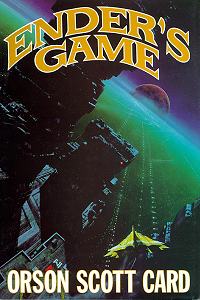
This is not a review of Orson Scott Card's novels Ender's Game and Ender's Shadow. Reviewing books published in the late '80s would be an exercise in futility. All that should be said about them has already been said, by commentators far more insightful than I. Instead, these are my personal reactions to the two novels by Card.

I read Ender's Shadow first, and became acquainted with Bean, the young product of genetic manipulation. As I got to know him, Bean gave me a new sense of what childhood is, and how it can transcend both cognitive giftedness and maturation. Bean's inevitable inner conflict between the child that he was and his off-the-scale intelligence exploded into the worlds of men and aliens. And nothing that happened in his fictional world seemed implausible in our own.
Somehow, Card's stories of special children and intra-galactic warfare avoid the trite theme of parallel evolution so common in Sci-Fi. And in a genre so crowded with, and dependent upon, technological innovation, the world of Battle School hit a fresh, clear note, in harmony with creation as it is, not as it would have to be for the fictional scenario to develop.
Because of Bean, I now look into babies eyes with new wonder; what is going on behind that cool stare? What thoughts are taking shape? What potential could be developed?
Perhaps one day I will write as well as Orson Scott Card.
No comments:
Post a Comment